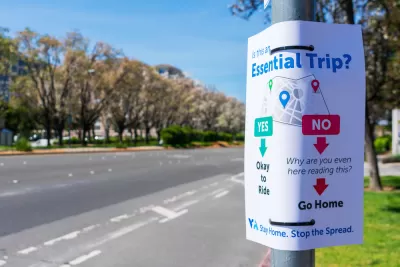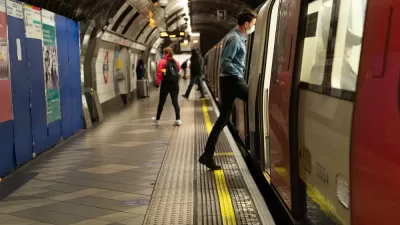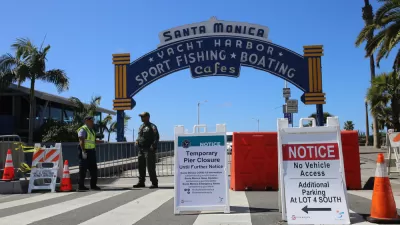Ridership is the wrong way to think about the importance of public transit.

Workers keeping the nation's essential industries and services going are still using transit, but there isn't much good news or positive thinking regarding public transit during the COVID-19 pandemic.
Transit ridership is in free-fall, plunging transit agencies all over the country into an unprecedented fiscal crisis. The CARES Act federal stimulus offered some relief for the fiscal situation facing transit agencies, but the long-term prognosis is completely uncertain. In New York City, the coronavirus has had tragic consequences for transit operators.
This tweet by Richard Florida sums up what most people are probably assuming about the prospects of maintaining public support for transit during and after the pandemic.
People will be scared of subways, busses & trains for some time, with implications beyond transit systems.
They will turn to cars, congestion will increase.
Wonderful transit-connected suburbs may suffer.
Demand for close-in walkable, bikeable neighborhoods will grow. https://t.co/sPJrly2qP7— Richard Florida (@Richard_Florida) April 9, 2020
So, what can be said in defense of the operation and use of public transit in a public health crisis like the COVID-19 pandemic? According to Jarret Walker, a transit planning consultant involved in some of the most innovative bus redesign projects in the United States during the past decade, transit is not just essential in these uncertain times, it's more important than ever.
"The goal of transit, right now, is neither competing for riders nor providing a social service for those in need. It is helping prevent the collapse of civilization," writes Walker for CityLab.
The catch, according to Walker, is that public transit has always been playing that critical role.
Those “essential service” workers, who are overwhelmingly low-income, have always been there, moving around quietly in our transit systems, keeping our cities functioning. Too often, we have patronized them by calling them needy or dependent when in fact everything would collapse if they couldn’t get to work.
Walker's purpose in writing this article is not to look at the crisis with rose-colored glasses, or diminish assessments of the long road back to recovery for transit agencies. Walker doesn't even suggest that sentiments like those expressed above by Richard Florida are wrong. Walker does suggest its time for everyone, first and foremost journalists, to reframe the discussion away from questions about ridership, and toward a better understanding of the essential service provided by transit agencies.
FULL STORY: In a Pandemic, We're All 'Transit Dependent'

Montreal Mall to Become 6,000 Housing Units
Place Versailles will be transformed into a mixed-use complex over the next 25 years.

Planetizen Federal Action Tracker
A weekly monitor of how Trump’s orders and actions are impacting planners and planning in America.

DARTSpace Platform Streamlines Dallas TOD Application Process
The Dallas transit agency hopes a shorter permitting timeline will boost transit-oriented development around rail stations.

Without International Immigrants, the Rural US Population Would Be Falling 58%
Census data shows that population growth in rural areas is due in large part to international migrants.

Dead End: Nine Highways Ready for Retirement
The Freeways Without Futures report describes the nation’s most promising highway removal proposals.

Congressman Proposes Bill to Rename DC Metro “Trump Train”
The Make Autorail Great Again Act would withhold federal funding to the system until the Washington Metropolitan Area Transit Authority (WMATA), rebrands as the Washington Metropolitan Authority for Greater Access (WMAGA).
Urban Design for Planners 1: Software Tools
This six-course series explores essential urban design concepts using open source software and equips planners with the tools they need to participate fully in the urban design process.
Planning for Universal Design
Learn the tools for implementing Universal Design in planning regulations.
City of Mt Shasta
City of Camden Redevelopment Agency
City of Astoria
Transportation Research & Education Center (TREC) at Portland State University
City of Camden Redevelopment Agency
Municipality of Princeton (NJ)
Regional Transportation Commission of Southern Nevada




























